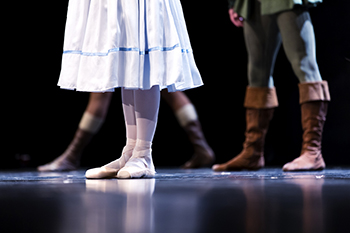
There are a variety of factors that can contribute to a dancer injuring their feet or ankles. Some factors are things the dancer cannot control, such as body type, age, the shape of feet and ankles, existing medical conditions or prior injuries, and the type of dance and surface they are dancing on. Other factors that can be avoided and are within the dancer’s control include not warming up/stretching/cooling down properly, wearing improper footwear, not staying hydrated or eating properly, and not building up the frequency or duration of performances and/or practices gradually. Dancing injuries can also occur if the dancer is attempting moves that are beyond their skill or ability at the time of injury. Any type of foot or ankle injury that a dancer suffers should be examined by a podiatrist as soon as possible. Trying to “muscle through” an injury that needs professional treatment can lead to further injury and may even prevent the dancer from being able to dance if the injury does not heal properly. Every dancer is different, and every injury is different. A podiatrist will create a custom treatment plan after thoroughly examining the dancer’s injury.
Ankle and foot injuries are common among athletes and in many sports. They can be caused by several problems and may be potentially serious. If you are feeling pain or think you were injured in a sporting event or when exercising, consult with one of our podiatrists from Toe-Tal Family Foot & Wound Care Professionals . Our doctors will assess your condition and provide you with quality foot and ankle treatment.
Common Injuries
The most common injuries that occur in sporting activities include:
- Achilles Tendonitis
- Achilles Tendon Rupture
- Ankle Sprains
- Broken Foot
- Plantar Fasciitis
- Stress Fractures
- Turf Toe
Symptoms
Symptoms vary depending upon the injury and in some cases, there may be no symptoms at all. However, in most cases, some form of symptom is experienced. Pain, aching, burning, bruising, tenderness, tightness or stiffness, sensation loss, difficulty moving, and swelling are the most common symptoms.
Treatment
Just as symptoms vary depending upon the injury, so do treatment options. A common treatment method is known as the RICE method. This method involves rest, applying ice, compression and elevating the afflicted foot or ankle. If the injury appears to be more serious, surgery might be required, such as arthroscopic or reconstructive surgery. Lastly, rehabilitation or therapy might be needed to gain full functionality in the afflicted area. Any discomfort experienced by an athlete must be evaluated by a licensed, reputable medical professional.
If you have any questions, please feel free to contact our office located in Vista, CA and Las Vegas, NV . We offer the newest diagnostic and treatment technologies for all your foot care needs.
